Letter dated at Smyrna, Turkey, 18 February 1821, from David Offley, to his sister, Mrs Mary Offley Sharpless, No. 178 South Front Street, Philadelphia, Pennsylvania, USA.
The writer of this letter, David Offley, (1779-1838), was born in Philadelphia; He served as 1st Lieutenant in the 10th U.S. Infantry, at Carlisle Barracks, Pa., 1798-1800; Established the first American commercial firm in Turkey, at Smyrna in 1811, and was the chief U.S. merchant in Turkey; U.S. Commercial Agent to Turkey; Negotiated the first U.S.-Turkey commercial treaty in 1830, and in 1832, was appointed by President Andrew Jackson, 1st U.S. Consul at Smyrna.
Offley writes of his three sons — Richard Jones Offley (1800-1842), John Holmes Offley (1802-1845), & David Washington Offley (1805-1846) — who live with him in Turkey, and especially of his concerns and plans for the 20 year-old Richard, his oldest, who has been in Constantinople for a while. We learn from this letter that Offley’s daughter, Anne Powell Offley (1811-1839), was residing in Philadelphia with his sister, Mary (Offley) Sharpless, the recently married wife of Blakey Sharpless, to whom he wrote this letter. Offley’s first wife, and the mother of all these children, was Mary Ann Greer. After her death, Offley married a woman from Dalmatia named Elena (“Helen”) Curtovitch and had at least eight more children. Offley writes his sister that he has heard of a shoemaker in Philadelphia who cobbles shoes together with iron and brass, rather than sewing them, and sends his sister his measurements, asking her to have this shoe maker make him a dozen pairs, expecting that they will last him the rest of his life.
Includes:
Smyrna 18 February 1821
My dear sister,
The letter from our Cousin, Martha Reeve, 19th Oct., announced to me formally the marriage of my dear sister. I know of no language capable of expressing my pleasure and wishes on this event. I leave to your heart to understand the sentiments of mine. I beg you to repeat to my new Brother the welcome into our family, and my sincere wishes towards the accomplishment of all his desires. I further entreat his kind friendship to my little daughter, who I am much persuaded will profit by his addition to our family. My dear Helen [his second wife, a Greek Turk who he married in 1819] joins me sincerely in all my wishes on the occasion of your marriage. She is in good health, and expects every day to lay in.
Richard has been absent these three months past at Constantinople. I expect his return every day. I have been much flattered by all I have heard of him during his stay in that place. It is probable he will proceed to America by the first good conveyance. I feel much anxiety on his account. He will, this year, come to his 21st year, and I think it now time he should begin to walk alone. On the other hand, trade is so miserably bad that I cannot but reasonably fear that any capital I might be disposed to advance him will be quickly lost. I have many plans for him – an establishment at Constantinople – that he should go to the U. States, purchase a small vessel, & trade between this & Philad. – that he should pay a visit to the U. States without engaging in business, make friends & acquaintances, and thus pass two years. This would cost at least 2000 Dollars, and perhaps it will be less, then should he enter into business; and lastly and perhaps the best, that he should remain quiet where he is, until something might turn up.
As to Master Holmes [another son, who joined him in Turkey], you need not give yourself any uneasiness. He is in a good counting house, where I have good accounts of him. He is a great hand among the young ladies, and if I would only allow him as much money as he wants, would no doubt be better contented. This I believe is his only chagrin.
Master David is very domestic, grows finely, and when he shall be corrected of his insufferable pride, will make, I hope, a clever fellow.
You have never told me whether you rec’d from a Mr. Cabot of Boston, I believe 2, certainly one, cask of wine. A Capt. Chandler of Baltimore was to remit some money to Mother on Richard’s account. He has also in the hands of a house in N.York, 800 Dollars, which I shall advise him to deposit with the same Banker. These moneys are to be held to his order. The opportunity by which I now write, is expected to return here immediately; perhaps may not remain in N.York more than 20 days. Mr. Turnbull has promised me to let you know in time. I understand a Mr. Bedford, shoemaker in Philadelphia, is famous for making shoes nailed with Iron & Brass, instead of sewing. I enclose a measure, and directions for 1 doz. pair shoes, which I expect will last me the rest of my life, and which please order to be made. Pay for the same, and have them forwarded to N.York, care of Mr. Turnbull.
I have just heard of the arrival of Richard in the neighbourhood, where he is detained by a gale of contrary wind. I almost doubt whether he will arrive in time to write you. Remember me affectionately to Rachel and her husband…
Our poor brother John, I am anxious to hear how he comes on. He has gone so far, he must now go to the bottom of the hill, and if he cannot settle with his creditors any other way, he must go to prison, and then they perhaps will be more tolerable. Let him give up every thing he has, and then if his creditors will not give him a discharge, I hope his friends will do all in their power to assist him to get over by Law…
To my dear daughter, many kisses. Tell her to love her father, who never lets one day pass without thinking of her. When her eyes shall be well, then she will be more attentive to school and will be soon able to write her a letter. But should her eyes be so tender that such use of them would be injurious, it is much better she should entirely abandon school than injure her eyes; besides, for the best part of education, the eyes are no way necessary, or at least not absolutely so…
I remain most affectionately my ever dear little sister Mary, your affectionate brother, — David
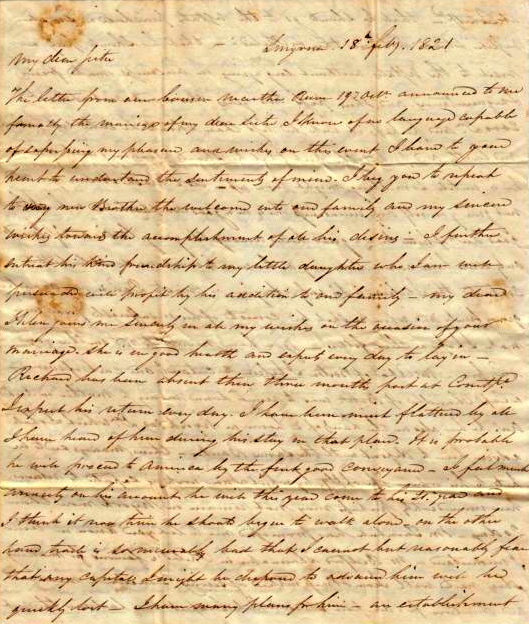 |
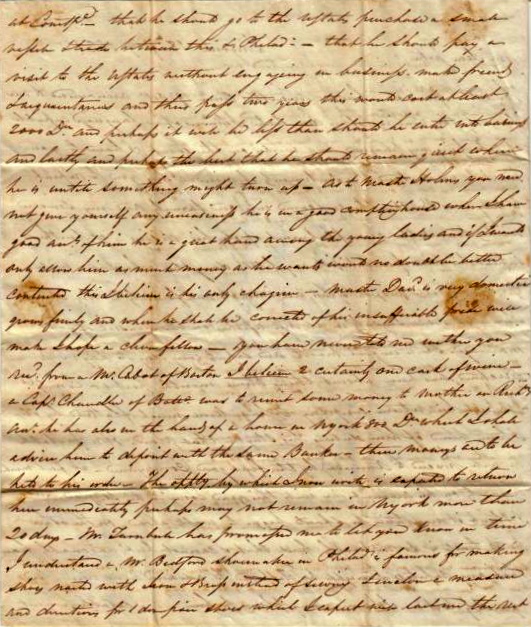 |
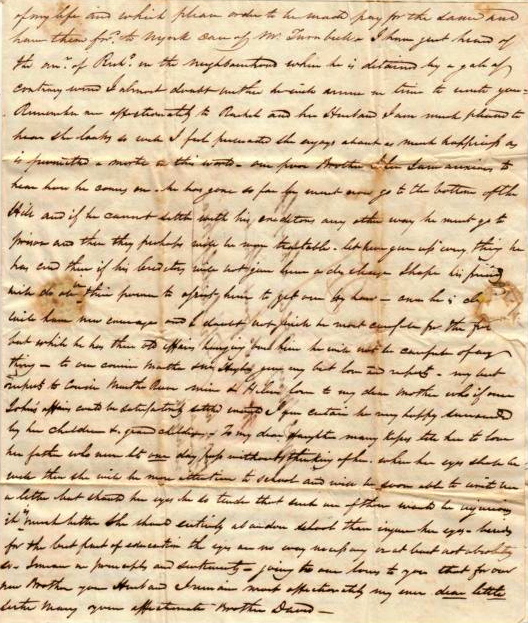 |
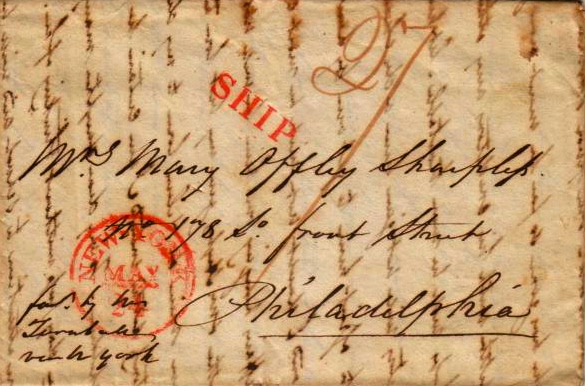 |
Letter dated at Smyrna, Turkey, May 25, 1821, (and continued on May 30th, and June 1st), from David Offley, to his sister, Mrs. Mary Offley Sharpless, at Philadelphia, Pa.
He writes that there is an Embargo in place on ships leaving Smyrna, so he’s not sure how he will get this letter out, and continues with a lengthy discussion of the outbreak of violence by the Turks against Greeks, and other foreigners in Smyrna, arising out of the war between Turkey & Greece. He notes that over 40 murders had been committed by the mob, and many Europeans, Americans, etc. had taken refuge on board ships. He notes that although there are 2 American ships in port, he was not invited to take refuge on either of them, and he made arrangements to go on board a Russian ship if it became necessary. He describes how the situation of his house is ideal for defense against the mob, and how the situation has caused business to come to a standstill. He notes that some calm has been restored in Smyrna, due to the arrival of a Pasha who has instilled some order there. He also discusses the perilous situation of Greece, and thinks they are lost unless some European power comes to their aid.
Includes:
“This moment that I sit down to write, a new embargo exists, but every thing is so uncertain, that perhaps it may be as quickly taken off and the Vessel by which I now write will depart that moment, so I must have my letter ready at the time. I wrote you the P.S. to my last letter...we were in the state of the greatest possible alarm and I was now believe with still more reason than even then knew of the Turks are, and with reason, exceedingly exasperated against the Greeks. Unfortunately, the strangers in town do not know how to discriminate between them and other Christians...The Governor and other authorities of the City had lost all command and respect among the lower orders, so that we were entirely at the mercy of an armed mob, and I look on it as really astonishing that in all that time, not more than about 40 murders were committed, and those principally where old quarrels existed. Mr. Woodmass had all his family on ship board, as had most other Europeans in the place. For my part, altho’ I had all preparations made to embark, I did not do it, having two children at the breast. To be on board ship was particularly agreeable. Altho’ we had two American vessels in the port, I had no invitation from either of them to take refuge on board their vessels until after I had engaged the cabin of a Russian ship on more occasions than one. I have had to remark that Americans in general have less nationality than any other nation.
Business is for the moment at a complete stand. Thank fortune we owe no money, and are unfortunate in having large sums due to us that God only knows how much of it we shall ever get. Our consolation is that with cash in hand, goods in store, and debts that we took on as perfectly secure, we always have a handsome capital left to continue business. The only difference will be that I shall not be able to render that assistance to my boys as they come of age, that I expected to do. I must now look out for my young children to secure them the advantages (if they are such) of a good education.
My wife has kept up her courage in a most astonishing manner (he married a Greek woman in Smyrna, Helena Curtovich, in 1820 - and as a Greek, she would have been in especial danger during the mob attacks). My house, it is true, is so situated on the marine that it is easily defended, and from which I have at all times a secure retreat on ship board.
Most fortunately for us, a Pasha has arrived & taken the command of the City and he has given us the assurance of perfect tranquility, and from what we have witnessed these three days past, we have reason to confide in his assurances. No disturbances whatever have taken place...the strangers are all sent out of the town, and our streets are no longer filled with idle Turks walking about in search of adventures. The Pasha is known to be frequently in the streets under different disguises, and as a wink from him is sufficient order to take off a head, every one is careful how he conducts himself. Yesterday I went thro’ all the Bajars and met with no insult whatever. It is where I would not have gone ten days ago for any consideration. All is tranquil at Constantinople....
30th May. All has been quiet, and we begin to recover our hopes that all may yet go well, except indeed for the Greeks, who are doomed certainly to suffere much. Business has a little revived, and we have been able to get in some money. We have some hopes the embargo will be taken off tomorrow morning.
June 1st. The embargo is partially taken off. A few vessels will be allowed to depart, and among the number, the American. We are tranquil and hope may remain so.
The accounts respecting the Greeks in Europe are very contradictory. This, however, appears most likely, that unless they are assisted by some European power, they will not be able to contend against the Turks. We hope here there is no danger of a war with Russia should their hopes be well founded. I trust the time is not far distant when every thing will be returned to its usual order. If otherwise, God only knows what may become of us.
I have not time by this opportunity to write Mr. Allen and if I had not began yours, it would have been the same. Please send for him and communicate to him the news of our situation. In trade there is nothing doing. I expect our produce this year will be very low....”
Kiss my dear little daughter for me. My love to mother, brothers & sisters in all which I am joined by my Helen as well as in the assurances, my dear sister, of our wishes for your happiness.
Your affectionate brother, -- David
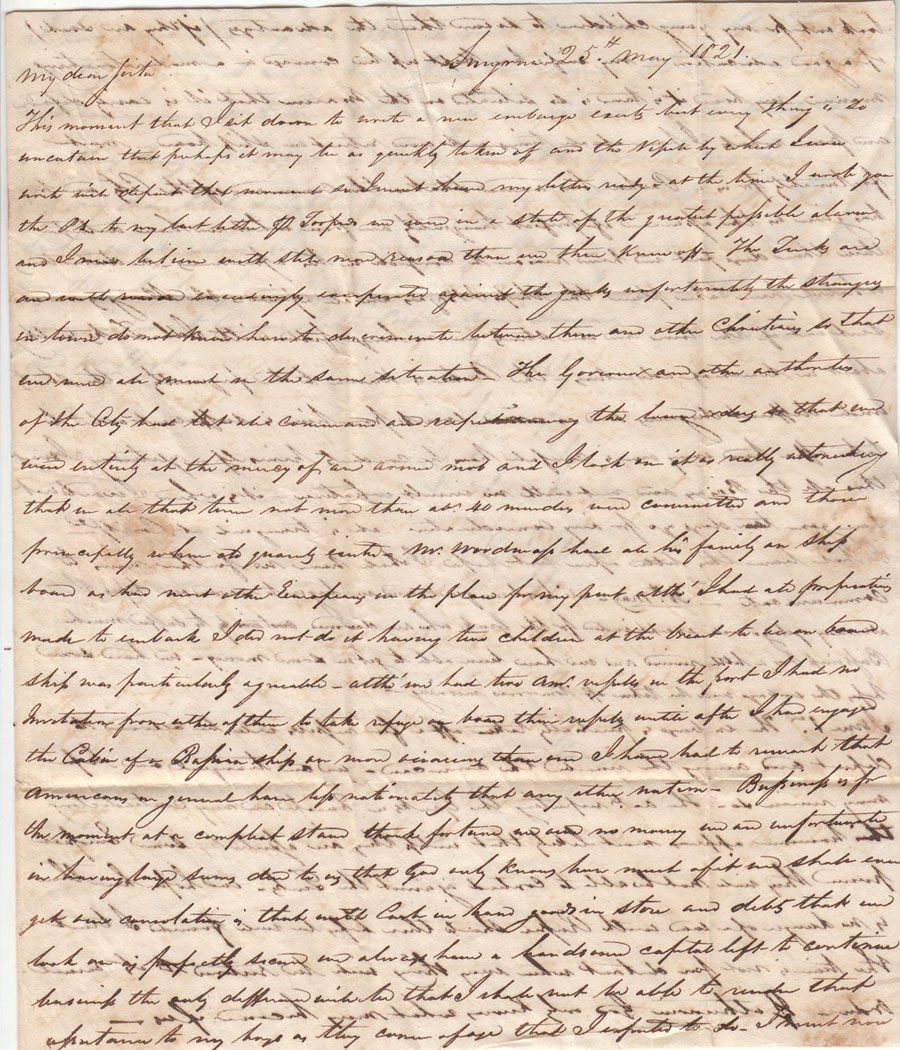 |
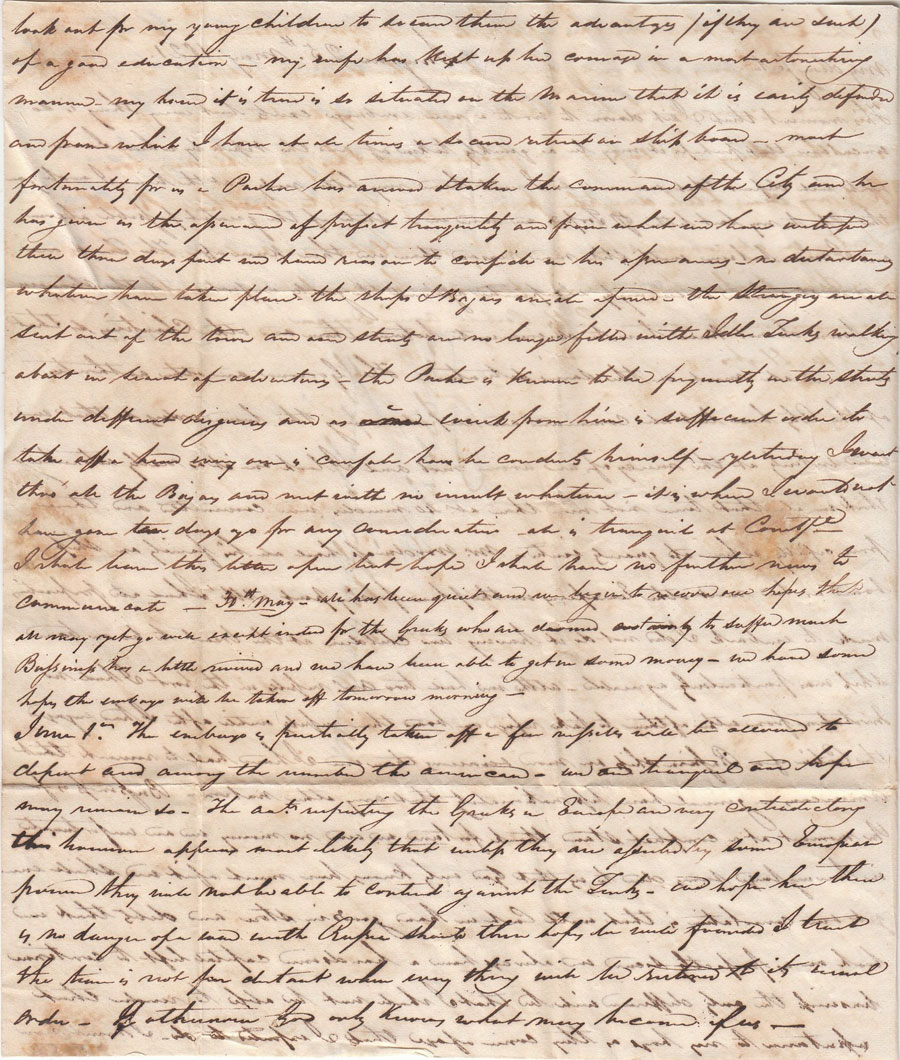 |
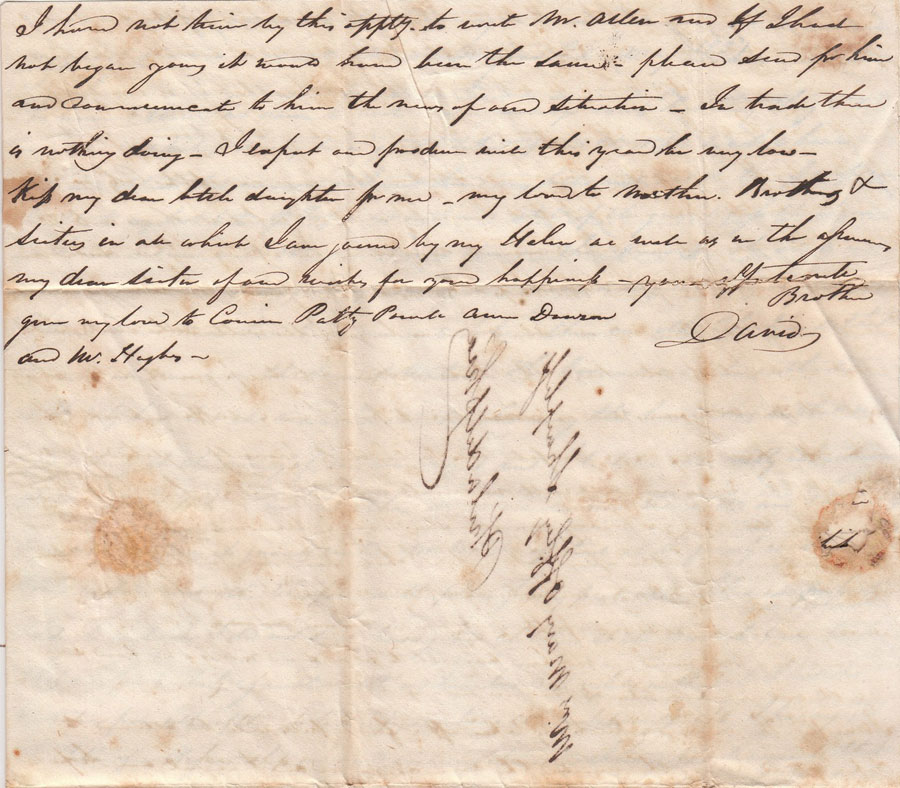 |
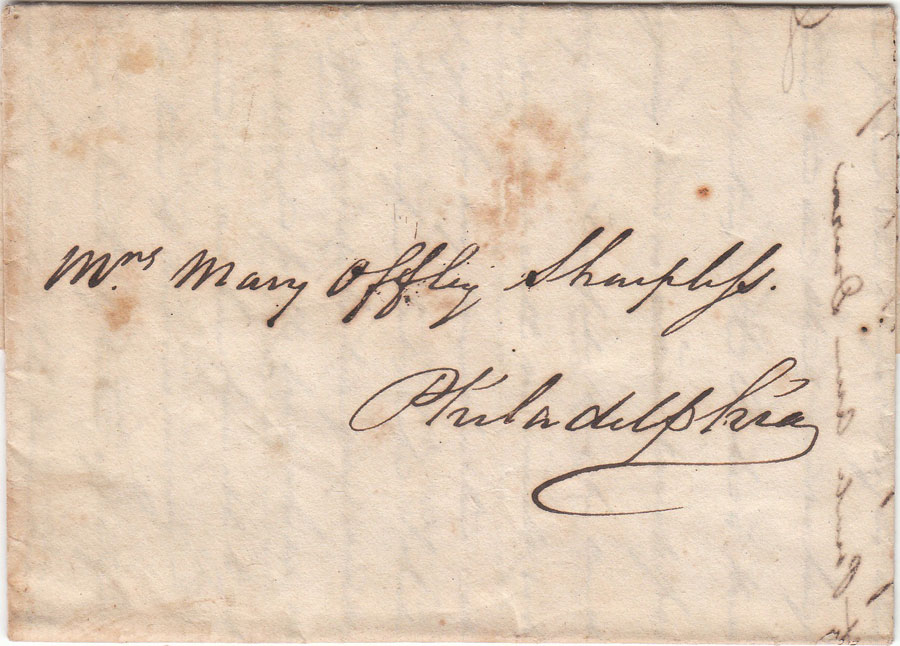 |